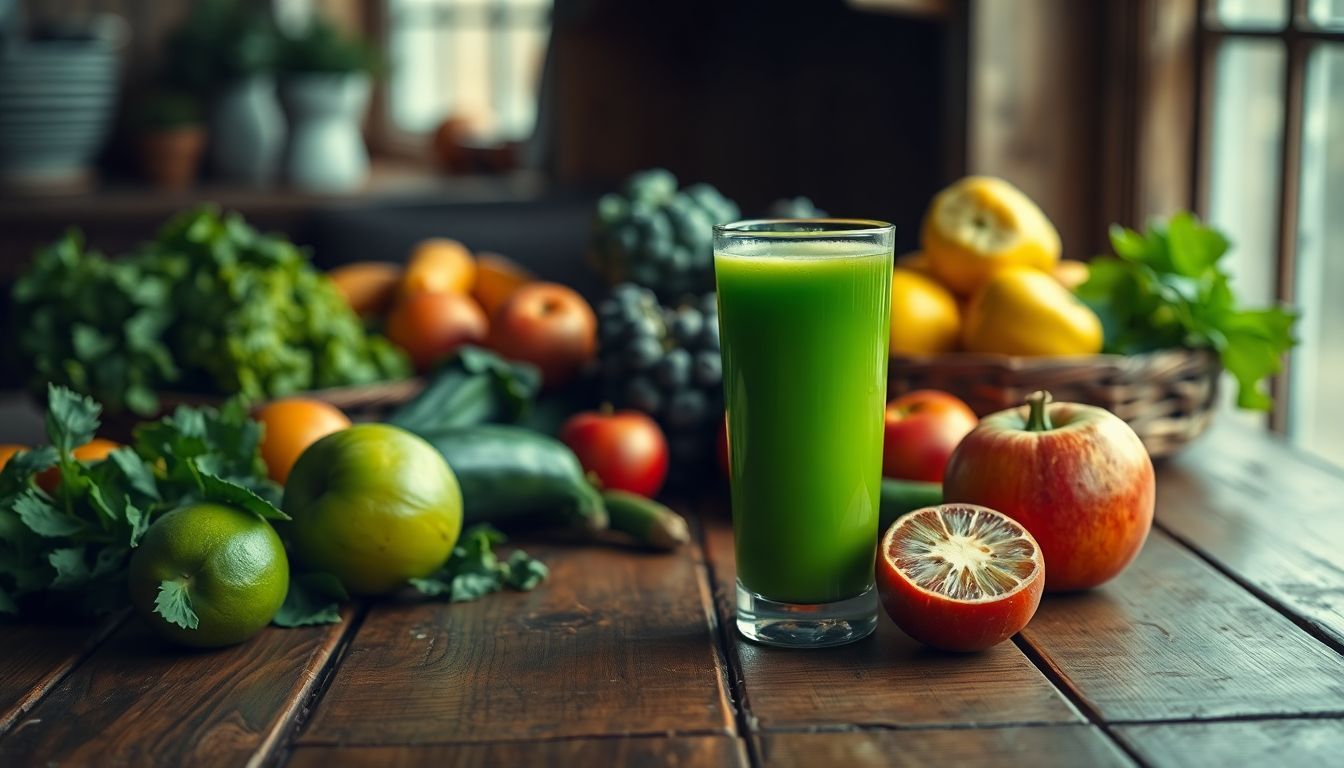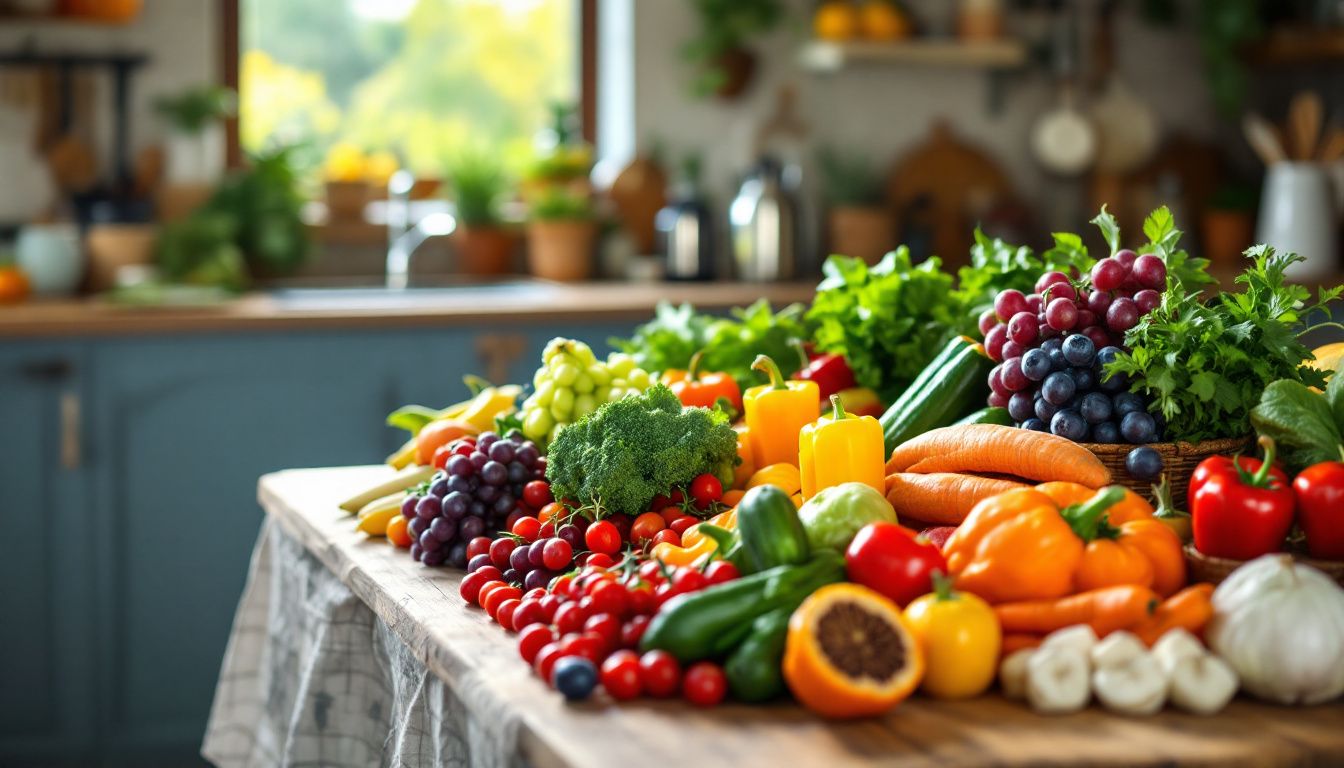Struggling to figure out if juicing is worth the hype? Many believe it’s a quick way to boost your health with fruits and vegetables. This blog will explore the real benefits, downsides, and myths about juicing.
Thank you for reading this post, don't forget to subscribe!Keep reading—there’s more than meets the eye!
Key Takeaways
- Juicing offers quick nutrients like Vitamin C and antioxidants but removes fiber, which supports digestion and fullness.
- High sugar content in juices can spike blood sugar levels. A single 3.9-ounce apple juice has 13 grams of sugar, similar to soda.
- Juice cleanses lack strong scientific proof for detoxing the body; liver and kidneys naturally handle this process.
- Weight loss from juice diets is often water weight, not fat loss, and may lead to muscle mass loss or fatigue over time.
- Whole fruits, vegetables, or smoothies with fiber are healthier alternatives for long-term benefits like better digestion and heart health.
Benefits of Juicing
Juicing can load your body with nutrients fast. It might help improve energy and support overall health, making it a popular choice for many.
Packed with vitamins and nutrients
Carrot juice and citrus fruits, like oranges and grapefruits, provide a hefty dose of vitamin C. This boosts immune system strength and helps repair tissues. Mixed fruit juices are loaded with antioxidants that reduce oxidative stress, lowering the risk of cardiovascular disease.
A 14-week study showed improved beta-carotene and vitamin C levels in people who drank mixed vegetable juice regularly. These drinks also support nutrient absorption by offering concentrated vitamins and minerals without cooking or extra processing.
Supports skin health and immunity
Juices, especially citrus-based ones, are rich in Vitamin C. This nutrient helps boost the immune system while supporting skin repair. Antioxidants in these juices can fight oxidative stress, which may reduce signs of aging.
Phenolic compounds in fruit and veggie juices offer antibacterial properties too. Beet juice contains nitrates that encourage a healthy gut—further aiding immunity. Including vegetable juice with polyphenols might even improve skin tone by reducing inflammation over time!
May assist with weight management
Juicing can help with weight loss if used wisely. A 2017 study showed a 3-day juice-only diet, providing 1,310 calories daily, led to lasting weight loss and changes in gut bacteria.
These healthy microbes are linked to better digestion and fat reduction.
Drinking low-calorie vegetable juice like carrot juice may support a balanced diet while keeping blood sugar levels stable. But relying only on juices for long periods may lead to muscle mass loss or even weight gain if they contain high added sugars.
Downsides of Juicing
Juicing might seem healthy, but it has a few hidden issues. Some juices can impact blood sugar levels or lack key nutrients for good digestion.
Lacks fiber compared to whole fruits
Most juices lose healthy fiber during processing. Fiber supports digestion, heart health, and stable blood sugar levels. Whole fruits and vegetables provide this essential nutrient, which helps prevent issues like bloating or high blood sugar spikes.
Fiber also promotes fullness. Without it, juice won’t keep you satisfied for long and may leave you hungry sooner. Studies link fiber to a lower risk of colorectal cancer and better gut bacteria balance—key benefits missing from many juicing diets.
Dietary fiber is vital for overall health—it’s not just about regularity.
Can be high in sugar and calories
Juices often carry a lot of natural sugar. For example, just 3.9 ounces of 100% apple juice has about 13 grams of sugar. That’s almost the same as drinking soda! Drinking larger servings or several glasses can add up quickly.
Calorie counts also go through the roof with juicing. Combining five fruits into one drink may pack over 500 calories and more than 100 grams of sugar. This can raise blood sugar levels fast, which isn’t ideal for diabetics or those watching their weight.
Regularly consuming such calorie-dense drinks may lead to obesity, type 2 diabetes, and other chronic conditions like metabolic syndrome.
May not provide lasting detox benefits
Juice cleanses often claim to detox the body, but science disagrees. The liver and kidneys handle detoxification naturally. There’s no strong proof that juices enhance this process or offer lasting results.
Many studies supporting these claims come from animal testing or flawed research.
Relying on juice fasting for detox can lead to short-term effects, like weight loss from water depletion. This is not sustainable and might harm your health over time. Whole vegetables and fruits provide better long-term support for the digestive system—let’s explore myths about juice cleanses next!
Juice Cleanses: Myths vs. Reality
Juice cleanses promise quick fixes, but do they truly work—or just leave you hungry and tired? Keep reading to uncover the truth.
Do juice cleanses help with detoxification?
Juice cleanses do not effectively detoxify the body. The liver and kidneys naturally handle detoxification without special diets or drinks. Claims that juice fasting flushes toxins lack strong scientific support, according to the National Center for Complementary and Integrative Health (NCCIH).
A cleanse may provide vitamins like vitamin C but often misses fiber from whole fruits and vegetables. This can lead to spikes in blood sugar levels due to high natural sugars in fruit juices.
Long-term use of detoxification diets or laxatives tied to cleansing can also weaken digestive health or cause kidney problems over time.
Are juice cleanses effective for weight loss?
Juice cleanses can cause quick weight losses, but this is mostly water weight. A 2017 study showed participants lost up to 1.2 kg during a 3-day juice cleanse. This weight loss is temporary and not from burning fat.
The body sheds fluids and sometimes muscle mass instead of actual fat.
Relying on juice fasting may harm long-term health goals. These diets often limit calories too much, causing fatigue or irritability. Over time, extreme restrictions could lead to emotional eating or even disordered eating behaviors.
Whole food alternatives with balanced nutrition are better for sustainable results without the risks associated with fad diets like juice cleanses.

Alternatives to Juicing
Switching to other choices can boost your health in ways juicing alone cannot—keep reading to explore better ways to enjoy fruits and veggies.
Incorporating smoothies
Smoothies keep fiber from fruits and vegetables, which aids digestive health. They also provide satiety by including skins and pulp. Unlike juices, smoothies include protein options like Greek yogurt or nut butter, boosting muscle mass and reducing hunger.
A mixed-berry smoothie with spinach can offer antioxidants to support the immune system.
They work as part of a balanced diet rather than a meal replacement. Smoothies help regulate blood sugar levels better than juice cleanses due to slower digestion of carbs. Adding leafy greens like kale or carrot juice raises vitamin C intake while keeping calorie counts lower.
Eating whole fruits and vegetables
Whole fruits and vegetables keep all their fiber intact. This helps with digestion, improves gut bacteria, and reduces the risk of chronic conditions like heart disease. A diet high in fiber also lowers total cholesterol levels, improving overall cardiovascular health.
Eating whole fruits supports weight management better than juice alone. Fiber makes you feel full longer, which can help prevent overeating. Increased intake of whole produce has been linked to reduced obesity risks and better digestive health over time.
Healthier Alternatives to Ultra-Processed Foods
Fresh fruits and vegetables are great swaps for ultra-processed snacks. They provide high fiber, essential nutrients, and antioxidants without added sugars or unhealthy fats. A 2020 review showed that processed foods make up 60% of the American diet—linked to heart disease, type 2 diabetes, and cancer.
Simple changes like choosing carrot sticks over chips support better health.
100% fruit juices and vegetable juices can also be helpful but with caution. While they offer vitamins like vitamin C and ascorbic acid, they may lack fiber compared to whole produce.
Smoothies made with whole ingredients are a balanced choice too—they deliver fiber, improve digestive health, and help maintain stable blood sugar levels… Next: Incorporating smoothies into your diet!
Conclusion
Juicing has both perks and pitfalls. It offers vitamins and plant nutrients but lacks fiber and may spike sugar levels. Juice cleanses aren’t the miracle they’re hyped to be for detox or weight loss.
A balanced diet with whole foods often works better for lasting health. Always seek guidance from a trusted dietitian or doctor before making major changes to your routine.
For more information on healthier eating practices, check out our guide on how to keep ultra-processed foods off the menu with healthier alternatives.
